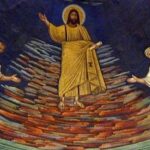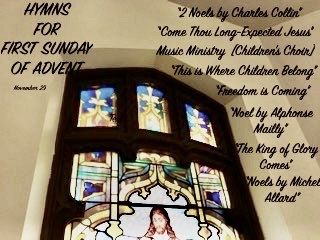COME SING WITH US THIS FIRST SUNDAY OF ADVENT
Come to a church that’s refreshing, inspiring, and fun!
At Princeton United Methodist Church, we play beautiful classical and sacred music during worship, and that refreshes the spirit. We also sing well-known, new hymns and “gospel and folk songs” that lift us to Heaven. We pray that our music will inspire everyone, old and young, and help them find faith and hope. Our hymns this First Sunday of Advent – the Fourth Sunday before Christmas – resonate with the theme of hope as we prepare for the Messiah’s coming and the celebration of Jesus’ birth. Our gospel music is a cry for freedom and justice.
“Come Thou Long-Expected Jesus”
“Come Thou Long-Expected Jesus” was written in 1774 by Charles Wesley as an  Advent hymn to celebrate the Nativity of Jesus and prepare for the Second Coming. The orphans’ situation in the areas around him and the great class divide in Britain inspired Him to write this hymn. His texts allude to Scripture passages: “Born Your people to deliver, born a child and yet a King, born to reign in us forever, Now Your gracious kingdom bring.” Wesley’s hymn recalls Isaiah’s words of a sin-weary and captive Israel longing for freedom, reminding us that God’s promised redemption is the “hope of all the earth.” The hymn also refers to Mark, chapter 13, which assures believers that Christ will come again, inspiring us to continue to hope for that promise. To watch a Youtube video of this hymn, click here.
Advent hymn to celebrate the Nativity of Jesus and prepare for the Second Coming. The orphans’ situation in the areas around him and the great class divide in Britain inspired Him to write this hymn. His texts allude to Scripture passages: “Born Your people to deliver, born a child and yet a King, born to reign in us forever, Now Your gracious kingdom bring.” Wesley’s hymn recalls Isaiah’s words of a sin-weary and captive Israel longing for freedom, reminding us that God’s promised redemption is the “hope of all the earth.” The hymn also refers to Mark, chapter 13, which assures believers that Christ will come again, inspiring us to continue to hope for that promise. To watch a Youtube video of this hymn, click here.
“Freedom is Coming”
“Freedom is Coming” is a South African protest song that has been performed by  choirs around the world. The original version was a gospel song, “Jesus Is Coming.” The words were changed in South Africa by people wanting to end apartheid. “Freedom is coming (3x) oh yes, I know (repeat).” “Justice is coming (3x) oh yes I know (repeat).” “Freedom is coming” helps raise awareness of the political context, and the stanza “Jesus is Coming” brings hope with the expectation of Jesus’ birth. This song carries with it a significant promise that should always be fulfilled — “Oh, yes, I know!” However, some feel that the freedom it promises is never fully realized, considering the injustice that people continue to suffer worldwide. Nevertheless, just singing it brings a feeling of liberty. It has also inspired the song “Freedom is Coming Tomorrow” in the passionate South African musical, “SARAFINA” first performed in Johannesburg in 1987. School choirs have also sung “Freedom is Coming” as a tribute to Nelson Mandela. To watch a Youtube video of this hymn, click here.
choirs around the world. The original version was a gospel song, “Jesus Is Coming.” The words were changed in South Africa by people wanting to end apartheid. “Freedom is coming (3x) oh yes, I know (repeat).” “Justice is coming (3x) oh yes I know (repeat).” “Freedom is coming” helps raise awareness of the political context, and the stanza “Jesus is Coming” brings hope with the expectation of Jesus’ birth. This song carries with it a significant promise that should always be fulfilled — “Oh, yes, I know!” However, some feel that the freedom it promises is never fully realized, considering the injustice that people continue to suffer worldwide. Nevertheless, just singing it brings a feeling of liberty. It has also inspired the song “Freedom is Coming Tomorrow” in the passionate South African musical, “SARAFINA” first performed in Johannesburg in 1987. School choirs have also sung “Freedom is Coming” as a tribute to Nelson Mandela. To watch a Youtube video of this hymn, click here.
Click here to listen to the PUMC worship service, hear the beautiful music, the children’s time, the scripture readings, the sermon, the prayers, and the story sharing.
Images Source: Google Images
Written by Isabella Dougan

